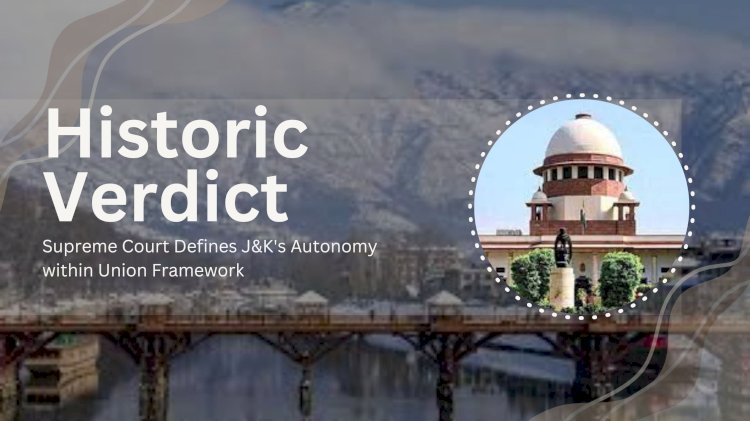Historic Verdict: Supreme Court Defines J&K's Autonomy within Union Framework
The Supreme Court's groundbreaking verdict affirms that the Jammu and Kashmir (J&K) Constitution substantially curtails the executive powers of the Union of India. This decision, rooted in the historical context of J&K's unique autonomy granted by Article 370, highlights the intent to safeguard the region's distinctive identity and local aspirations. While proponents view this ruling as a preservation of federalism and cooperation, critics express concerns about potential precedents and practical implications. As the nation grapples with the aftermath, discussions on the balance between federal authority and state autonomy take centre stage in the evolving constitutional discourse of India.
By Shreya Rajvanshi Gangal

In a landmark decision that holds far-reaching implications for the constitutional dynamics between the Union of India and the state of Jammu and Kashmir (J&K), the Supreme Court of India has ruled that the J&K Constitution significantly limits the executive powers of the Union government. This judgment comes as a result of a prolonged legal battle that sought to ascertain the scope of authority wielded by the Union within the confines of J&K's unique constitutional framework. The verdict has sparked widespread discussions about federalism, states' rights, and the delicate balance of power between the Union and its constituent states.
Supreme Court's Verdict and Legal Context:
The Supreme Court's verdict, delivered by a bench of five justices, delves deep into the historical and constitutional context of the relationship between the Union of India and Jammu and Kashmir. The J&K Constitution, adopted in 1957 following the region's accession to India in 1947, has often been a point of contention due to its special autonomy provisions. Article 370 of the Indian Constitution granted J&K considerable autonomy, allowing the state to have its own constitution and decision-making powers, except in matters of defence, foreign affairs, finance, and communications.
The court's decision emphasized that the intent behind Article 370 was to ensure that J&K's unique identity and local aspirations were preserved. It concluded that the Union's executive authority cannot unilaterally override the constitutional provisions and principles enshrined in the J&K Constitution.
Implications and Public Reaction:
This ruling has ignited debates among legal experts, politicians, and citizens alike. Supporters of the verdict argue that it upholds the spirit of federalism and respects the historical agreements made during the integration of J&K into the Indian Union. They believe that this decision will have a positive impact on the overall relations between the Union and its states, fostering a spirit of cooperation and mutual respect.
However, critics express concerns that this judgment might set a precedent that could embolden other states to demand similar autonomous arrangements, potentially challenging the uniformity of the Indian legal framework. Moreover, questions arise about the practical implications of the ruling on issues such as land ownership, citizenship rights, and economic development.
Conclusion:
The Supreme Court's ruling on the limited executive powers of the Union of India within the framework of the Jammu and Kashmir Constitution marks a significant chapter in the constitutional discourse of the nation. The judgment underscores the delicate balance between federal authority and state autonomy, reflecting the evolving nature of India's constitutional fabric. As the legal and political spheres absorb the ramifications of this verdict, the nation is poised for further discussions on the dynamics of governance, federalism, and the principles that bind this diverse nation together.
What's Your Reaction?


















